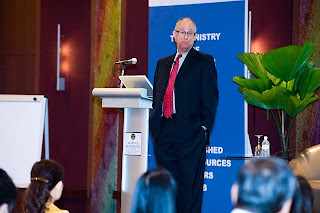In a recent Business Times article dated 19 March 2012, titled "Service is just one part of the satisfaction equation", the author highlighted survey results from the Customer Satisfaction Index of Singapore (CSISG) conducted by Institute of Service Excellence at SMU (ISES), which indicates that consumers are getting savvier in discerning and differentiating service quality and satisfaction of the service organization in general.
The author gave the example of the Retail's service quality which fell from a score of 72 to 70.9 in 2011. But satisfaction with retailers rose from 68.2 in 2010 to 70.6, indicating that customers were happier with department stores, supermarkets, and retailers of fashion apparel, watches and jewellery.
The CSISG,whose methodological foundations are those of the American Customer Satisfaction Index, the de facto standardized measure of customer satisfaction in the US since 1994, has three key drivers: expectations, value and quality.
I remembered posting way back on June 11, 2008 about the challenges that service organizations face in developing, marketing and maintaining the level of delivery in their services. I also highlighted that service has 4 unique characteristics; intangible, inseparable, heterogeneous and perishable; core fundamentals which every service organizations need to understand to be able to design holistic end-to-end delivery systems.
And as Ms. Caroline Lim, Director of ISES rightly noted, while service quality; one half of the last driver which also involves product quality; is important, the other drivers are equally important. Thus the need for service organizations to look into the dimension of service quality and a good framework that service organizations should use is the Gaps Model of Service Quality developed by Parasuraman, Zeithaml & Berry in 1985.
 |
| source: The Marketing Association of Australia and New Zealand |
To reduce Customer Gap, service organizations should also seek to understand the 10 determinants of service quality that helps service organizations focus on removing non value-adding processes or 'muda' from their delivery system.
 |
| source:The Marketing Association of Australia and New Zealand |
A much cited testament of one such international service organization that is widely recognized as best-in-class is The Ritz-Carlton Hotel Company; proud recipient of The Malcolm Baldrige National Quality Award from the United States Department of Commerce twice in 1992 and 1999; The Ritz-Carlton Millenia Singapore won the Singapore Quality Award from SPRING Singapore in 2001.
There are other management tools and techniques such as the 7Ps of service marketing, Lean and one that is much cited in recent times, Design Thinking. I will discuss a little more about Design Thinking in my next post, so keep a look-out for it.
Management often flounders with the myriad options available for improvements and the key to this is to sit down and conduct a "stock-take" of its current operations. An option would be to conduct a self-assessment using BEACON by SPRING Singapore, distill the results, and determine 3 key areas for improvement in the work year. As Steve Jobs once said, "Deciding what not to do is as important as deciding what to do".
























